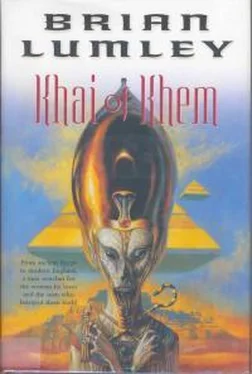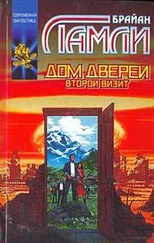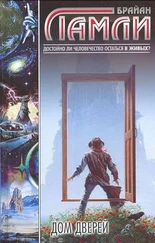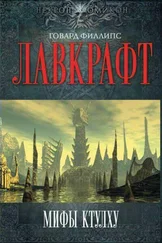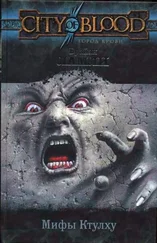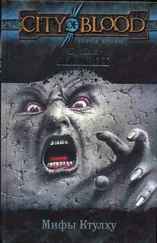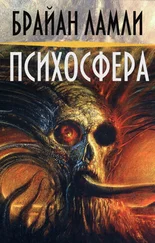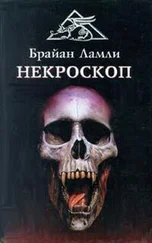“My Lord, I only—”
“Be quiet!” ordered Manek. “And look,” he changed the subject, “did I not see the flash of a mirror from the hills just then?”
“Aye, Lord. The mirrors have been talking for an hour or more. Since the rising of the sun. In a little while, within the hour, we will reach the camp of the Candace. Even now she awaits your coming with the general Khai, for our horseman carried your word to her last night, since when she has not slept but waited for you. The mirrors have told all of this, but you have not been watching. Your mind has been busy with more important things and so you have not seen the mirrors talking or read their messages.”
“Aye, you are right.” Manek saw little point in denying it. “My mind has been with the general Khai. He was a warrior among warriors.”
“He surely was, Lord, even if he was a Khemite! Will there be a cure for him, do you think?”
“I think not!” Manek harshly answered. Then, seeing the surprised look on his driver’s face, he added: “What use to bolster false hopes? You can see him there and know he lies as one dead. Indeed, he is dying. But if the doctors of Kush can save him, then he will be saved. Now let it be, my friend, and concentrate on your driving. Take me home to the hills of Kush. To Kush … and to the Queen who waits there.”
It was early afternoon. All through the morning Manek Thotak had been questioned by the Candace—almost to the point of interrogation—and to little or no avail. The three royal physicians had attended Khai on his couch in Ashtarta’s tent, and as a man had proclaimed him poisoned and on the brink of death. One of them, Hathon-al, had said he thought it just possible that the general was possessed of demons, and that perhaps they could be let out by boring a small hole in his head.
Trepanning was an operation with which Hathon-al was acquainted; his father had performed a similar exorcism on a young woman some thirty years ago. Because of the intervening years, however, he was not completely sure of the postures and incantations; but still he was perfectly willing to try. He would use only the most beneficent postures, and his brother physicians might care to join him in the utterance of their favorite and most curative incantations.
Ashtarta, who like her father before her had little faith in the healing magic of the physicians, had ordered them out of her tent. Theirs was a mixture of magic and science not at all to the Queen’s liking. She could accept magic for its own sake—indeed, she had ample proof of the efficacy of many forms of the mystic arts—but she suspected that the doctors were mere amateurs in occult matters. All well and good that they should mend broken bones and sew up gashes, but when the soul itself was injured … ? The true mages, on the other hand, had earned Ashtarta’s respect in more ways than one; and now, acting on Imthra’s advice, she called them to her tent.
There were seven of them in all, their number signifying the Seven Mystic Arts of the Ancient Ones—those mighty God-magicians who came from the stars with all knowledge at a time lost in the world’s dim and terrible infancy—and it was as a direct result of the incredible efforts of the seven that the balance of the war with Khem had swung in Ashtarta’s favor, when their magic had stemmed dark forces which had changed the face of Africa for thousands of years to come and which, but for them, had perhaps blasted the whole world forever!
At the onset of Kush’s latest offensive the seven had gone into the most inaccessible regions of the Gilf Kebir, and there they had remained in a secret place, using their long-range magic whenever the armies of Kush most needed their aid. Now a dozen riders were out looking for them, with orders to bring them to the Candace at once; and while she waited for their arrival, which might not be for several days, Ashtarta questioned Imthra about their powers.
These were Alchemy (the old man explained), which did not originate in Khem at all but had been old when the Nile was a mere streamlet; Fascination, or hypnotism; Necromancy, or communication with the dead; Pyromancy and the control of elemental fires; Oneiromancy, or the interpretation of dreams; Elementalism, the control of the elementals of air, earth and water; and finally Mentalism, the use of the mind as a physical power. All of these arts were embodied in the seven mages to one degree or another; and Imthra himself, having been a student of the Ancient Wisdom all of his long life, understood something of them all.
As Imthra’s interpretation of the arts of the seven grew more complicated and detailed, the general Manek Thotak sat on his chair and listened intently. Though sunken-eyed, the young general seemed very alert for a man who must by now be greatly in need of sleep, and plainly he was absorbing all that was being said. This almost anxious interest of his did not go unnoticed by Ashtarta, who put it down to the fact that Manek shared her own great concern for Khai Ibizin’s well-being. And yet... she had been far from satisfied with Manek’s version of Khai’s misadventures, and even less satisfied with the truce he had arranged with the Pharaoh.
Now, as Imthra began to define the powers of mentalism—which in a later age would be known variously as telepathy, telekinesis, levitation and so on, and grouped under ESP in general—she put up a hand to stop him. She, too, was very tired, and Imthra’s droning voice was making her even more so.
“Later, later,” she told the old man. “For the moment I would speak again with the general.”
“Ashtarta,” Manek immediately responded, straightening up in his chair and granting himself the familiarity of first-name terms, “I feel I must offend you by my presence. The dust and grime of travel are still on me. I am unwashed and uncouth. Perhaps if I were to—”
“You do not offend,” she cut him off, “nor have you ever. But indeed I am sure that your weariness has dulled your mind and tongue, for still I find the things you have told me unsatisfactory. Explain to me once more, if you will, how the general Khai comes to be in his present condition. Leave nothing out, for the future of all Khem—if indeed the Land of the Pharaoh has a future—surely lies in the balance.”
The three of them were seated about the body of Khai where he lay as one dead upon his couch, and now Imthra sighed and leaned back in his chair, steepling his fingers on his chest and relaxing for the moment. In her present mood, the Candace was most demanding. He had suffered her angry ranting, her furious, frustrated sobbing and impatient questioning, for some hours. Now it was Manek Thotak’s turn once more and Imthra was glad to be off the hook.
As of yet, the Candace seemed to have forgotten that she had ordered him to provide interpretations of their dreams at the Pool of Yith-Shesh, for which he was grateful. While her dream had been very difficult to understand and probably full of symbolism, his own had been fairly easy; but he knew that if he told it to Ashtarta, and if he so much as hinted at its meaning as he suspected it, then that she would be heartbroken. Better first to let the seven mages see Khai, and then to tell them of that ominous vision glimpsed in the flames of the cavern pool.
So, while Imthra sat and wrapped himself tiredly in his own thoughts, Ashtarta prompted her general again, saying: “Well, Manek? I am waiting.”
“Majesty,” he answered, “I’ve already told you everything there is to—”
“Tell me again, and do not sigh at me. How was Khai taken?” She reached down and laid her hand on the stricken man’s cheek.
Читать дальше
